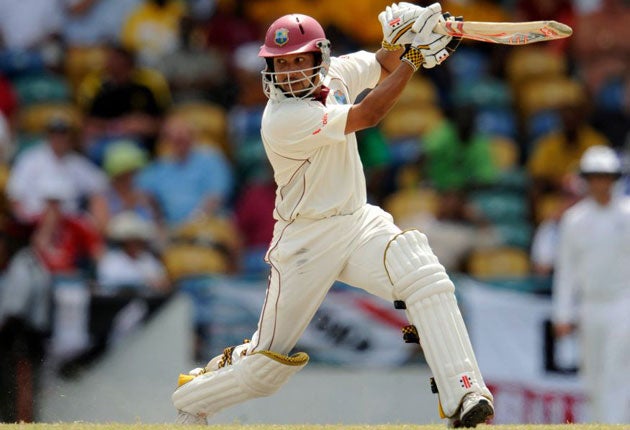Tony Cozier: Guyana's great talent finally runs out of bad luck
Sarwan must at times have wondered why fate had dealt him such a tough hand

Your support helps us to tell the story
From reproductive rights to climate change to Big Tech, The Independent is on the ground when the story is developing. Whether it's investigating the financials of Elon Musk's pro-Trump PAC or producing our latest documentary, 'The A Word', which shines a light on the American women fighting for reproductive rights, we know how important it is to parse out the facts from the messaging.
At such a critical moment in US history, we need reporters on the ground. Your donation allows us to keep sending journalists to speak to both sides of the story.
The Independent is trusted by Americans across the entire political spectrum. And unlike many other quality news outlets, we choose not to lock Americans out of our reporting and analysis with paywalls. We believe quality journalism should be available to everyone, paid for by those who can afford it.
Your support makes all the difference.Ramnaresh Sarwan's flawless, chanceless, classically composed 291 was essential to the West Indies' resolve not to be overwhelmed by what Andrew Strauss termed the "scoreboard pressure" of England's 600 for 6 declared in the fourth Test.
But for his careless dismissal for 94 in the first innings in Antigua, it would have been the fourth successive three-figure innings of the series for the 28-year-old Guyanese. At last he is producing the prolific consistency that has previously eluded him and can fulfill Ted Dexter's prediction, on seeing his unbeaten 84 on debut aged 19, that he would end with a Test average of 50.
It has been a significant turnaround, as much personally as for the team. Following the departure of Brian Lara in 2007, he is a key component in the batting along with Shivnarine Chanderpaul and Chris Gayle but he has been on an emotional rollercoaster over the past few years.
On the tour of Pakistan, late in 2006, he was surprisingly dropped for the second Test and told by Lara, then captain, that it was a chance for him to "reflect and hopefully come back more energetic and more purposeful".
Taking over as captain on Lara's retirement after the last World Cup, he was into his second Test in the role when he so badly dislocated his shoulder in the field at Headingley that he had to be temporarily replaced, first by Daren Ganga, then by Gayle.
He returned for the World Twenty20 Championships in South Africa but injury yet again intervened and eliminated him from the subsequent tour of Zimbabwe and South Africa. Gayle took over once more and has been in the post ever since. While it was an arrangement that Sarwan maintained he was comfortable with, he must have occasionally wondered why fate had dealt him such a tough hand.
Back for the home series against Sri Lanka and Australia last year, there was no hint that his misfortunes bothered him. Quite the opposite. His class and experience at No 3 were intact.
His double of 57 and 102 against Sri Lanka at the Queen's Park Oval in Port of Spain guided the West Indies to a rare, series-levelling victory. His 65 and 128 were instrumental in earning a draw against Australia in Antigua.
He arrived for the tour of New Zealand last December as Gayle's vice-captain. He was free of injury, in the runs in a preceding series of one-day internationals against Pakistan in Abu Dhabi and $1 million richer after the Stanford Superstars' win over England.
His surprise announcement on arrival in Auckland that he was quitting the vice-captaincy was the first sign that all was not right. As no explanation was offered, the rumour mill found its own reasons. The most prominent was that he and Gayle, previously close friends, had fallen out. His approach to batting, with scores of 8, 11 and 1 in the two Tests that followed, only fanned the speculation.
Whatever was plaguing him – he has acknowledged that he wasn't "mentally right" – clearly is not any longer. His partnership of 202 with Gayle in the first Test scotched talk of their alleged differences; that of 148 with Chanderpaul that occupied almost four hours was the basis of the West Indies' great escape in the previous Test in Antigua.
There was more significance to his sixth-wicket stand of 261 with Denesh Ramdin here. As vital as it was in the match, it was also essential in guiding the wicketkeeper to his first hundred in his 33rd Test. A previous average of 20 belied the importance of his position at No 7.
Join our commenting forum
Join thought-provoking conversations, follow other Independent readers and see their replies
Comments